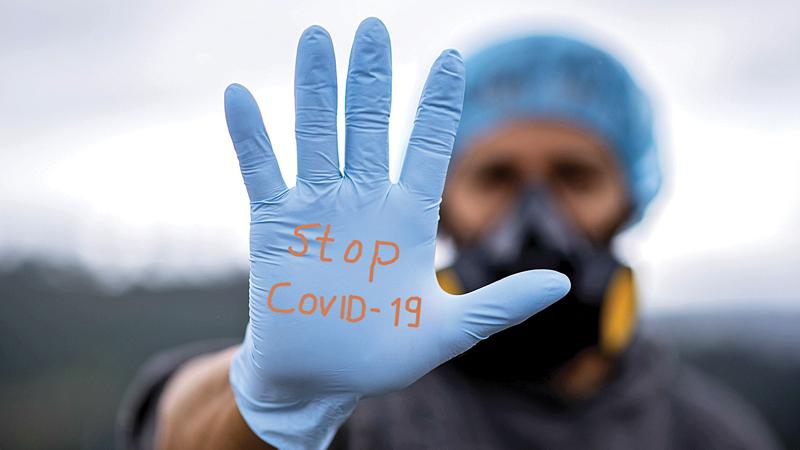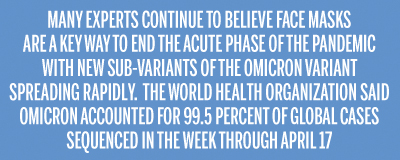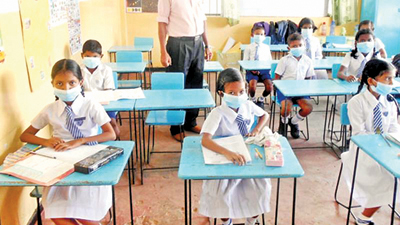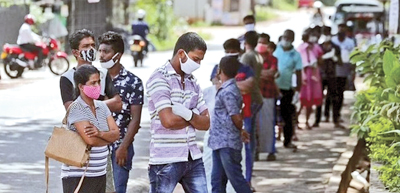
 The Government took a rather wise decision to reinstate the mask mandate, after earlier deciding that the time is perhaps right for ditching the face masks. However, medical specialists raised the alarm that the time is not yet ripe for doing away with the face masks as Covid is still prevalent in society. There is also the factor of new variants such as BA.2 and XE, which can again cause an outbreak of the dreaded viral disease. Moreover, there are large public gatherings for protests etc. these days, which can also lead to a resurgence of Covid.
The Government took a rather wise decision to reinstate the mask mandate, after earlier deciding that the time is perhaps right for ditching the face masks. However, medical specialists raised the alarm that the time is not yet ripe for doing away with the face masks as Covid is still prevalent in society. There is also the factor of new variants such as BA.2 and XE, which can again cause an outbreak of the dreaded viral disease. Moreover, there are large public gatherings for protests etc. these days, which can also lead to a resurgence of Covid.
The Government should be commended for reversing the decision to drop the mask mandate. After all, there was no pressure from the public to ditch the face masks and almost everyone complied with the mandate. Disposable surgical face masks are very cheap and even the higher quality KN 95 masks do not cost the Earth.
Preventing respiratory and allergy diseases

Many scientific studies have shown that face masks work – in many Eastern societies face masks have been worn regularly even before the advent of Covid, for they prevent many other respiratory and allergy (autoimmune) diseases apart from Covid. In the case of Sri Lanka, a Covid resurgence could have dangerous repercussions as many drugs are in short supply in hospitals due to the Dollar crisis and we cannot afford to purchase new anti-virals such as Paxlovid which are somewhat expensive, due to the same reason.
In this scenario, it is advisable for all Sri Lankans to follow all health guidelines including wearing faced masks, washing hands frequently and keeping the social distance. Out of all these, masks seem to be the best approach. A large, randomised trial led by researchers at Stanford Medicine and Yale University conducted last year found that wearing a surgical face mask over the mouth and nose is an effective way to reduce the occurrence of Covid-19 in community settings.
It also showed that relatively low-cost, targeted interventions to promote mask-wearing can significantly increase the use of face coverings in rural, low-income countries.
“We now have evidence from a randomized, controlled trial that mask promotion increases the use of face coverings and prevents the spread of Covid-19,” said Stephen Luby, MD, professor of medicine at Stanford. “This is the gold standard for evaluating public health interventions. Importantly, this approach was designed to be scalable in lower- and middle-income countries struggling to get or distribute vaccines against the virus.”
The researchers enrolled nearly 350,000 people from 600 villages in rural Bangladesh. Those living in villages randomly assigned to a series of interventions promoting the use of surgical masks were about 11% less likely than those living in control villages to develop COVID-19, which is caused by infection with the SARS-CoV-2 virus, during the eight-week study period. The protective effect increased to nearly 35% for people over 60 years old.

Providing free masks, informing people about the importance of covering both the mouth and nose, reminding people in-person when they were unmasked in public, and role-modeling by community leaders tripled regular mask usage compared with control villages that received no interventions, the researchers found.
WHO’s view
In the intervention villages, they also saw a slight increase in physical distancing in public spaces, such as marketplaces. This finding indicates that mask-wearing does not give a false sense of security that leads to risk-taking behaviour — a concern cited by the World Health Organization during the early days of the pandemic when its officials were considering whether to recommend universal masking.
“Our study is the first randomized controlled trial exploring whether facial masking prevents Covid-19 transmission at the community level,” Styczynski said. “It’s notable that even though fewer than 50 percent of the people in the intervention villages wore masks in public places, we still saw a significant risk reduction in symptomatic Covid-19 in these communities, particularly in elderly, more vulnerable people.”
With Covid receding into the background in many countries, action has been taken to drop the requirement for wearing masks at all times. Instead, they are being targeted for instances such as surface and air travel. Nevertheless, there is a tussle between the authorities in these countries as well. The US Justice Department has filed an appeal seeking to overturn a Federal Judge’s ruling that ended the face-mask mandate on planes and other modes of public transport, after the US Centres for Disease Control and Prevention (CDC) said they are still needed to protect public health.

A notice of appeal was filed in a Federal Court in Tampa. This move came as the CDC cited its “continuing assessment that at this time an order requiring masking in the indoor transport corridor remains necessary for public health.”
Virus, highly unpredictable
Many experts continue to believe face masks are a key way to end the acute phase of the pandemic with new sub-variants of the omicron variant spreading rapidly. The World Health Organization said omicron accounted for 99.5 percent of global cases sequenced in the week through April 17.
Now we have lived with Covid-19 for exactly two years, the first case of the global viral disease having been detected here in March 2020. Tragically, 16,000 of our fellow citizens had succumbed to the virus by now. But there is a silver lining t00 – an astonishing 600,000 have recovered from the disease in the same period. Globally, close to six million have perished, while over 500 million have been afflicted.
But with the mask mandate back in place and vaccination having largely contained the virus, we should begin to think about an exit strategy as well. In other words, we must now learn to live with Covid like so many other countries. It goes without saying that the virus is highly unpredictable – it is evolving in real time and one cannot dismiss the possibility of another variant emerging that could be more lethal than Delta. The very fact that much of the developing world remains unvaccinated gives an opportunity for the virus to mutate and spawn new variants. But as things stand here, we can certainly see the light at the end of the tunnel. Still, the key to defeating the virus is following the health guidelines meticulously.
